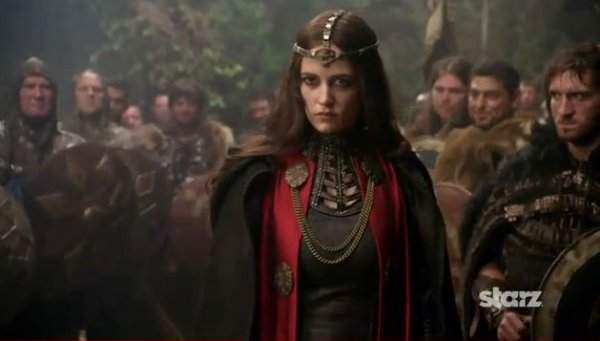The new series is interesting and exciting, but not all that magical.
When I first heard about the Starz series Camelot, I was a bit disappointed. I’m already into an Arthurian canon with BBC’s Merlin, One of my favorite shows on television, and I didn’t want to have to choose between Arthurian canons. I couldn’t imagine holding two different adaptations in my head at once, especially when I heard that the two series have writers and producers in common.
After seeing the first two episodes of the new series, however, I am no longer concerned. The two stories could not be more different, it’s as if they don’t even work from the same source material. Of course, in a sense, they do not, as they each draw from very different eras of Arthurian literature, and each take very different things away from it.
On one hand, in Merlin, Merlin is the outsider to Camelot, having just been brought there as a young man, and the same age as Arthur. The story is mostly about the freindship between Merlin and Arthur, and Merlin hides his power from everyone, Smallville-style.

Camelot, on the other hand, is the story of Aurthur’s rise to power, beginning with him as an outsider, not even aware of his heritage until after the death of Uther, and his sister Morgan seems to be his greatest challenge, as he will struggle to unite the land under his banner.
These are not just different parts of the same story, they are completely different. Camelot is also much darker in theme than Merlin. In just two episodes, we’ve seen enough bloodshed to fill a small swimming pool, and the characters are tortured by more than just teen angst, and an analogy for coming of age. These characters have real and violent issues to plod, and their challenges will not be overcome in a single episode.
The sexuality of Camelot is also much stronger. The series opens on a pair of naked young people, and they are not the last. Since the show is on Starz, a premium cable channel, they are free to show bare breast, and they do so gratuitously – though not untastefully.
Where it does match-up with Merlin is that it makes me wonder which paths they will take through Arthur’s story. There have been many versions of the tale, and each one picks and chooses elements from the others, and recombines, and reinterprets until the myriad of paths which may be taken branch like an enormous Tree of Sins.
The one I wonder about most just now is if they will take the route of incest. Merlin has already taken that one off the table by introducing Mordred as a child of the Druids.
However, in Le Morte d’Arthur, one of the most drawn from versions of the legend, Mordred – the man who eventually kills Arthur – is Arthur’s incestuous son by his half-sister, there called Morgause, who tricked him by changing her appearance, the same trick Uther used when Arthur was sired.
It wasn’t too risqué for Thomas Mallory’s 15th C. audience, but Starz might think twice before allowing that particular twist.






